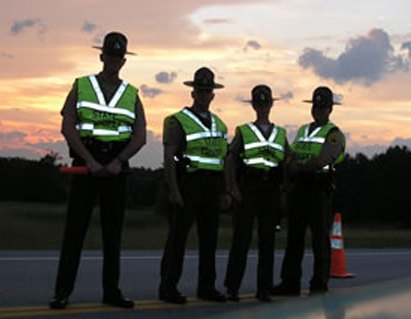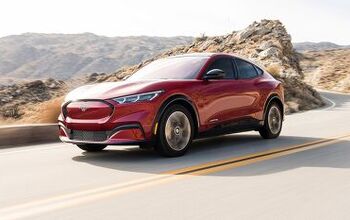Restaurant Industry: Just Say No to Police Roadblocks
When it comes to police roadblocks designed to catch drunk drivers, the public is conflicted . On one hand, there are plenty of people who believe that any anti-drunk driving law enforcement practice that saves even one life is fully justifiable. On the other hand, many Americans consider a police roadblock a quasi-fascist police tactic: an unconstitutional violation of their legal right to travel without facing [what they consider to be] indiscriminate search and seizure. Guess which way the American Beverage Association (ABI) comes down on the issue.
In these politically correct times, you might think the ABI would support ANY anti-drunk driving initiative, no matter how draconian. Nope. On the cusp of the traditional Memorial Day drink-driving law enforcement crackdown, the restaurant trade association “dedicated to protecting the on-premise dining experience” voiced their vehement opposition to random roadblocks.
“These police anti-drunk driving roadblocks target responsible adults who drink legally and responsibly before driving,” prnounced spokesperson Sarah Longwell. “They are all too easily avoided by the repeat offenders and chronic abusers who make up the overwhelming majority of today's drunk driving problem."
The ABI's press release cites a National Highway Traffic Safety Administration (NHTSA) study concluding that roving police patrols are almost three times more effective at apprehending drunk drivers than “random” roadblocks. In a telephone interview, Longwell said her organization’s anti-roadblock stance is more than a matter of stats. It reflects simple common sense.
“Which sounds more effective,” Longwell asked. “Putting cops on the streets and the highways who are trained to look for drunk and impaired drivers, or pulling them off the streets, making them stand at one place, and just check everybody who comes through to see if they may or may not be drinking.”
Longwell denies the suggestion that the ABI is trying to protect members whose customers may not drink due to possible police roadblocks– which would reduce the restaurant owners’ profits. She says her organizations’ “sober training certification program” proves that restaurants are doing their best to stop drunk driving.
“Our program teaches bartenders, waiters and waitress, the people on the ground, how to not over-serve, and how to spot people who are overly intoxicated and appear to be driving… A lot of it is about cutting off the service at a certain time or calling cabs, ensuring that they don’t get in the car if they’ve had too much.”
The ABI’s efforts to stem drunk driving at the source are to be commended, but their anti-roadblock arguments may be less compelling than they seem. Their press release quotes stats prepared with what can only be called fuzzy logic. For example: “The 11 states that do not operate roadblocks experienced 91 fewer alcohol-related fatalities collectively in 2005 compared to 2004.”
What’s more, TTAC could only find one recent NHTSA alcohol-related study: “Creating Impaired Driving General Deterrence: Eight Case Studies of Sustained, High-Visibility, Impaired-Driving Enforcement.” While the ABI may have crunched NHTSA’s numbers independently, the report does not conclude that roving patrols are three times more effective than roadblocks.
There’s also persuasive evidence to suggest that police roadblocks ARE successful at deterring drunk drivers. According to a Centers for Disease Control and Prevention (CDC) report published in the December 2002 issue of Traffic Injury Prevention, police implemented “sobriety checkpoints” decrease alcohol-related car crashes by about 20 percent.
The CDC review was based on 23 “scientifically-sound” international studies. The results were roughly identical, regardless of whether or not police checkpoints were short-term “blitzes” or operated continuously over several years.
No matter how drunk drivers are apprehended, the ABI believes that not offenders are alike. Unlike zero tolerance crusaders like Mothers Against Drunk Driving (MADD), Longwell’s organization lobbies for graduated penalties: ankle bracelets for hard core repeat offenders, less severe penalties for infrequent or less intoxicated drivers.
In this, the ABI is swimming against the tide. State laws against drunk driving are becoming increasingly severe. Many states (e.g. Kansas, Indiana and Georgia) have adopted “Habitual Violator Laws” that impose felony penalties for three DUI convictions, including the permanent loss of the violator’s legal right to drive and more limited prohibitions against voting or owning a firearm.
According to the Department of Justice, in 2005, police arrested nearly 1.4m drivers for driving under the influence of alcohol or narcotics. In that same year, 16,885 people, some 39 percent of all traffic-related deaths, were killed in alcohol-related motor vehicle crashes. And a CDC report found “insufficient evidence” to recommend the use of designated driver programs.
All of which leaves us where we started, with police roadblocks aimed at preventing/stopping drunk drivers. While you can understand the ABI and civil-rights-minded citizens’ distaste for police roadblocks, the questions must still be asked: what have we got to lose?
Are you in favor of police anti-drunk driving roadblocks?
More by Robert Farago
Latest Car Reviews
Read moreLatest Product Reviews
Read moreRecent Comments
- Theflyersfan My dad had a 1998 C280 that was rock solid reliable until around 80,000 miles and then it wasn't. Corey might develop a slight right eyelid twitch right about now, but it started with a sunroof that leaked. And the water likely damaged some electric components because soon after the leaks developed, the sunroof stopped working. And then the electrical gremlins took hold. Displays that flickered at times, lights that sometimes decided illumination was for wimps so stayed home, and then the single wiper issue. That thing decided to eat motors. He loved that car but knew when to fold the hand. So he bought a lightly used, off lease E-class. Had that for less than two years before he was ready to leave it in South Philly, keys in the ignition, doors unlocked, and a "Take it please" sign on the windshield. He won't touch another Benz now.
- Detlump A lot of people buy SUVs because they're easier to get in and out of. After decades of longer, lower, wider it was refreshing to have easier ingress/egress offered by an SUV.Ironically, the ease of getting in and out of my Highlander is very similar to my 56 Cadillac.
- Redapple2 LP Michigan. Long straights. A long sweeper. 2 chicanes. 4 hard turns. Lenghts of each element are different but similar to LeMans.
- Teddyc73 Doesn't matter, out of control Democrats will still do everything they can to force us to drive them.
- Teddyc73 Look at that dreary lifeless color scheme. The dull grey and black wheels and trim is infecting the auto world like a disease. Americans are living in grey houses with grey interiors driving look a like boring grey cars with black interiors and working in grey buildings with grey interiors. America is turning into a living black and white movie.


































Comments
Join the conversation
Turkeey: If and when you get to law school you'll want to take Criminal Procedure (which is actually a Constitutional Law course about the 4th and 5th amendments.) I don't have the cites handy but the short answer is that the Supreme Court has held that roadblocks for DUI enforcement (and enforcement of other traffic laws) are legal but roadblocks for non-traffic related crimes are not (the case in question took place in Indiana, I believe, where the police were setting up roadblocks to curb drug trafficking.) SalokJ: Regarding your hypothetical: If the item is in plain sight and the police see it, it can constitute probable cause to arrest you. It can also constitute probable cause to search the car. Remember that the police do not need a warrant to search an automobile on the highway, they only need probable cause. [Carroll v. United States, 267 U.S. 132 (1925)] The drug dog question is an interesting one. There was a Supreme Court opinion a couple of years ago that held that a drug dog sniff was not a "search" within the meaning of the 4th amendment and therefore could be conducted without even reasonable suspicion, much less probable cause. Of course, if the dog "hit" on a targeted vehicle, that, by itself, can be enough to establish the probable cause neccessary to justify a vehicle search.
I came across this article while on a break from studying for the bar exam. I figured it would be good review to post the info I have on Federal Criminal Procedure concerning roadblocks. Let me preface this by stating that every State can grant greater Constitutional protection to its citizens than the Constitution or Federal law provides (An example would be a State statute which requires the police to publish ahead of time in a local newspaper where sobreity road blocks will be placed), barring some exceptions. The point is, that a roadblock in one State, may not be legal in another State. Anyway here's what I have regarding roadblocks: Stopping a car is a seizure under the 4th Amendment. As a result, police may not stop a car unless they have at least at reasonable suspicion that a law has been broken. However, in certain cases where special law enforcement needs are involved, it is Constitutional for police to set up roadblocks to stop cars without individualized reasonable suspicion or any suspicion. To be Constitutional, a roadblock must: 1. Stop cars on the basis of some neutral, articulable standard (Such as stopping every other car or even every car). and 2. Be designed to serve purposes closely related to a particular problem related to automobiles and their mobility. [See Delaware v. Prouse, 440 U.S. 648 (1979); and See Indianapolis v. Edmond, 531 U.S. 32 (2000). A road block would likely be unconstitutional if, for example, the police stopped only cars driven by people under the age of 30 or people who drove cars worth less than 20,000 dollars. Either of these would fail the first prong of the test. Eitherway, the rationale for this is to satisfy the reasonableness standard in the 4th amendment. Everyone, I am sure, recognizes that drunk driving is a grave concern. Because a Constitutional roadblock does not single out anyone and offers some deterance to a problem on our roads, these roadblocks were deemed reasonable within the context of the 4th Amendment. Afterall, the 4th amendment provides protection against unreasonable searches and seizures.